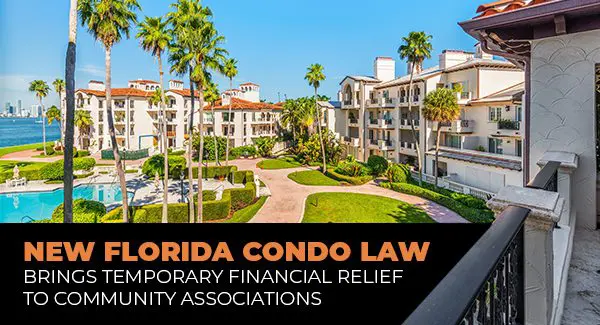- Community Associations, Legal Updates
- Florida
Florida community association board members and property managers received important news this month with the passage of Senate Bill 328, signed into law by Governor Ron DeSantis on June 20, 2025. The new law offers some financial relief and administrative breathing room for condominium associations grappling with the challenges of post-Surfside safety reforms.
Breaking Down the New Law
The reforms passed in 2022, following the tragic Surfside condominium collapse, require all Florida condos that are three stories or taller and 30+ years old (or 25 years old if within 3 miles of the coast) to complete Milestone Structural Inspections and Structural Integrity Reserve Studies (SIRS). Associations were also required to fully fund reserves for structural components based on the SIRS results, without allowing owners to waive or reduce funding.
This new Florida law does not roll back the state’s safety mandates, but it does give community associations more time to comply.
- Delays enforcement of mandatory reserves funding until 2026: Florida community associations were previously required to fully fund reserves for structural repairs starting in 2025. That deadline is now pushed back by one year to January 1, 2026, giving associations more time to prepare financially.
- Provides temporary relief from steep special assessments: By delaying reserve funding requirements, the law may help associations avoid or reduce immediate special assessments on unit owners in 2025.
- Gives boards more time to communicate with members: Many boards have been under pressure to explain new budget increases and long-term capital planning to their fellow unit owners. The extension provides a valuable opportunity for boards to educate owners about the importance of reserves, structural integrity reserve studies (SIRS), and safety compliance.
Key Takeaways for Board Members and Managers
While safety remains a priority, many Florida associations, particularly older communities with working-class or fixed-income owners, have struggled to meet these aggressive deadlines without imposing significant special assessments.
While this new law is not a cancellation of the requirements or a reason to delay safety planning. Rather, it acts as a one-year extension. Board members should use their time wisely and continue progress on necessary milestone inspections and SIRS evaluations if they haven’t already done so. Associations should revisit their budgets, meet with financial professionals, and consider incremental reserve funding increases to avoid steep hikes next year.
This is also an opportunity to communicate with association members. Many unit owners are confused about the law’s requirements and impact. Boards and property managers should utilize this extension to educate their respective communities, set realistic expectations, and discuss long-term capital planning. Reserve underfunding is still a major liability concern, both financially and legally.
Legal Resource
The new Florida law offers welcome short-term relief, but the long-term commitment to condo safety remains. Board members and property managers should treat 2025 as a strategic planning year to shape how well their community can weather the next phase of compliance and capital repair obligations.
If you are Florida community association board member, property manager, or community association leader with questions about these recent legislative updates, do not hesitate to contact our law firm.
Please call 855-537-0500 or visit www.ksnlaw.com.
Since 1983, KSN has been a legal resource for condominium, homeowner, and townhome associations. Additionally, we represent clients in real estate transactions, collections, landlord/tenant issues, and property tax appeals. We represent thousands of clients and community associations throughout the US with offices in several states including Florida, Illinois, Indiana, and Wisconsin.
Please note the material contained in this article is for educational and informational purposes only and does not constitute legal advice. No attorney-client relationship is established by your review or receipt of the information contained in this article. You should not act on the information discussed in this article without first obtaining legal advice from an attorney duly licensed to practice law in your State. While KSN has made every effort to include up-to-date information in this article, the law can change quickly. Accordingly, please understand that information discussed in this article may not yet reflect the most recent legal developments. Material is not guaranteed to be correct, complete, or up to date. KSN reserves the right to revise or update the information and statements of law discussed in the article law at any time, without notice, and disclaims any liability for your use of information or statements of law discussed on the article, or the accessibility of the article generally. This article may be considered advertising in some jurisdictions under applicable law/s and/or ethical rules/regulations. © 2025 Kovitz Shifrin Nesbit, A Professional Corporation.


